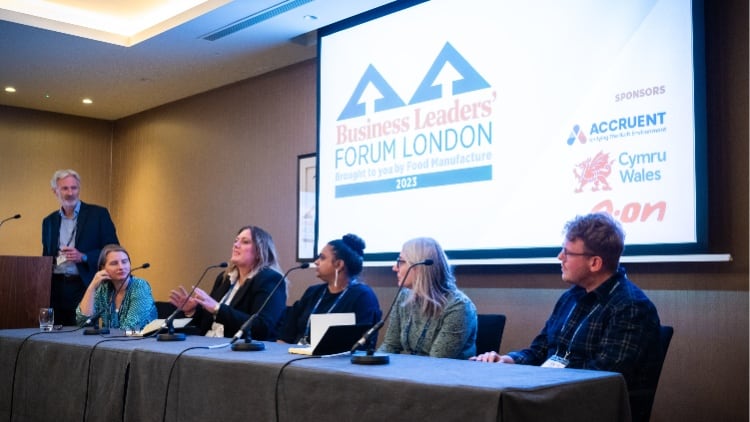Throughout the day’s events, the topics of regulation, education and sustainability dominated, with industry voices expressing particular concern over government’s commitment to – or lack of – the food industry.
Too much regulation
Unease around a flurry of regulation that is continuously changing and diverging, and with little enforcement, were shared concerns among this year’s Business Leaders’ Forum participants.
“We can cope with regulations; we might not like them but as long as they’re clear we can cope. But nobody seems to be able to help you. You are constantly waiting to be told you’re doing something wrong and waiting for a fine,” one delegate aired.
Another agreed, using new packaging rules as an example: “There have been so many changes and so many backtracks. I actually can’t keep up with it anymore. I’m now at the stage where I’m waiting someone to tell me I’ve done something wrong because I can’t afford enough people to work on it to figure out what’s happening with legislation.”
Whilst everyone agreed regulations are important, the extent of new rules coming into play has been detrimental to some businesses which are struggling with added costs, not to mention the time and energy it takes to navigate these rules.
“What is really holding my business back is Brexit. I would very much like to be entering different markets, but I cannot justify creating a business model to the level of the checks required.”
Others concurred, as they expressed qualms over border control processes.
“If you look at Europe and the amount of regulation that’s building up, doing business with the EU is going to get harder and harder.”
Meanwhile in the UK, enforcement of rules for product coming from the EU into our borders is just not happening, meaning sub-standard product is being allowed into UK borders. But if you reverse the scenarios and export to the EU, those same products will fail – it’s imbalanced, unsustainable and extremely costly to UK producers.
“What’s the future going to be like?” one attendee stressed, as they articulated their concerns over current regulatory confusion only becoming more exacerbated.
“My plea to government is to police it. If you are going to put in all these regulations, you have to protect us from criminal activity,” another added, as they explained how the current situation has opened up opportunities for food fraud.
Indeed, the reality is that it has become almost more profitable – and much easier – to smuggle in food than drugs, with the Food Standards Agency estimating food crime to cost the UK economy up to £2bn each year. This is not a new topic, having previously been addressed by Food Manufacture some years ago, and still it remains a huge issue.
In fact, it was only yesterday that the Food Standards Agency launched a new freephone number for the food fraud hotline in a bid to crack down on crime.
Food isn’t taken seriously
The consensus from the leaders is that system level thinking is needed to direct regulations more appropriately, which are presently too fixated on a single narrative. Rather we need to look at the issues holistically.
“We need the system thinking because what happens is people get hooked on individual perspectives and they talk about one thing,” said one attendee.
“Government and politicians take food for granted,” another industry representative weighed in, as they indicated a lack of understanding for the way food is produced and the many avenues it influences.
As a result of this political sway, the delegate said the same perspective has descended all the way through society, with food not being taken seriously.
While humans all know that food and drink is essential for survival, it’s not necessarily at the forefront of Western societies’ minds. Similarly, the idea of working in manufacturing has not been held in the high regard it should be.
“It’s not seen as a serious entity to be involved with,” the individual continued.
This fed into the topic of education, as one delegate regaled stories of teenagers that they had encountered who had no concept of how food is made.
“It is clear that manufacturing as an industry lacks glamour and appeal to Gen Z. Education is key, let’s get our message into schools, and the breadth of career opportunities in food visible to these young people,” said Joanne Munnelly – compliance technologist at the ZERO2FIVE Food Industry Centre at Cardiff Metropolitan University.
Opening up more factory doors to students was agreed to be a good starting point in shifting the narrative and creating awareness among Gen Z.
“Young people have slightly more connection to retail because it’s more visible. The retailers are also far more structured in teams of career pathways,” said one leader as an example for manufacturers to follow.
This point was expanded upon as a fellow attendee flagged issue with mainstream media hailing labour shortages as something which has not extended beyond fruit pickers.
“It’s not reflective of the sector,” said an attendee with reference to the lack of skilled engineers in F&B which doesn’t seem to have the same allure for a headline.
While another delegate suggested that the sector needed to bring positive news to grab the attention of policymakers. They used Lincolnshire as an example, which has invested a lot into the food and beverage space and seen a boost to its economy as a result.
“All of a sudden we’re part of the conversation because we’re bringing something to the party,” they noted.
Meanwhile another person questioned whether all these challenges will simply result in future UK producers moving elsewhere in a bid to find skilled workers and supportive policies.
“Why wouldn’t businesses start looking to move their factories to countries which are better fitted and with governments who are going to invest…?”
Keen to defend and share the hard work that the Welsh Government has undertaken, Keith Smyton, its head of food division, said: “Wales is the home for key multinational food and drink companies, who have established their businesses around a quality supply-chain offering. Closeness to market and a sustainable supply-chain offering that builds on the success of Welsh food and drink industry, with a global reputation for excellence and one of the environmentally responsible supply chains in the world.”
Collaboration: less talk, more action
The leaders acknowledged its need to come together to address the problems it faces rather than waiting for policy to offer a resolve.
“We need to show up as an industry,” one individual urged. “But the challenge is actually coming together.”
This was echoed by another, as they recalled an event where leaders agreed the same but nothing came from it. “Passion is fine, but you’ve got to also take action,” they emphasised.
“It’s very difficult to get competitors to come together. It’s improving but it’s still a challenge,” another responded.
It was agreed that regulatory steer, labour shortages and decarbonisation are all problems which require cooperation. In particular, the latter was said to be an impossible task to accomplish in isolation.
“The world will get to net zero, there’s no question about that. The only question is if human civilization will be here when it gets there.”
Global warming is, as the name suggests, a global problem – and it requires different skillsets and different businesses to unite. The sector not only needs to develop solutions in the absence of policy – particularly given recent government announcements of net zero pledge postponements – but it also needs to relay the message that ‘sustainable’ comes at a cost.
“It’s cheaper to buy milk than it is water – that just can’t be right, considering the amount of energy that goes into producing milk,” one attendee contended. “We are fundamentally undervaluing our food.”
The room was in agreement that consumers need to understand the cost of sustainability and appreciate food more.
Keen to bring industry together to drive sustainable innovation, Alex Smith MD at muesli producer, Alara Wholefoods, shared his vision of ‘The Knowledge Garden’ with his fellow leaders.
“Food inflation, supply chain disruption, climate change and health outcomes are bringing home the fact that reaching a sustainable society without making food central to this transition is impossible,” Smith asserted.
“Engaging with all the factors required for this transition for food will take a substantial and prolonged engagement that brings together both the knowledge required and the application of this knowledge on the ground. Near Kings Cross in central London is a development site where there is an opportunity to bring the required elements together in a project called the Knowledge Garden.”
With this area already being home to a range of companies with differing expertise, including Alara’s manufacturing site, Smith sees an opportunity to create a Silicon Valley-like hub that allows for sustainable and advanced food production and distribution.
Circling back to the discussion around inspiring our next generation of leaders, one delegate replied that this lent itself well to encouraging Gen Z into food and drink.
“Get them to be the role models and pitch it to politicians,” they offered.
Stop putting words into Gen Z’s mouths
Empowering Gen Z was raised later at the forum, during a workshop session which examined how we can attract new talent into the sector.
“I urge you to seek out young people's views,” said Penny Lamb, head of partnerships at VoteforSchools, who delivered an exceptional and insightful presentation around young people and perceptions before the panel session of experts joined together to devise actionable solutions for the labour gap.
“Not only are they your future clients, customers and talent; but have invaluable insights they will be only too happy to share with you!” She continued.
In fact, it was suggested we could “ask Gen Z to solve the problem” of labour shortages rather than second guessing them. Let them tell us why they are not interested in food and drink careers and how can we encourage them into such roles.
The same was said for retention – with one delegate proposing a new take on appraisals. Once you have someone working for your company, ask multiple choice questions, give them the opportunity to tell you how they want to progress rather than you dictating their future pathway. Perhaps someone working in picking has aspirations to move into engineering – and if so, how can you help them to get there? Not only is this good management but it will help create loyalty whilst potentially solving some of the industry’s issues.
The Gen Z workshop also gave way to other ideas such as mentoring and buddying up, with new recruits able to learn from established industry experts.
“We buddy up someone who is close to retirement age with someone who is new to the industry,” said one company representative. “Not only does that give them insight into the role, but we forget that sometimes these young people need a bit of pastoral care.”
Moreover, the act of buddying up is also extremely useful for the mentor as well as the mentee – after all, we all have different skills and expertise. Just because someone has been in the industry 30 years doesn’t mean they can’t learn something new from someone younger.
Digital transformation
The Business Leaders’ Forum also addressed the topic of technology, with similar challenges cropping into the conversation of skills gaps, problems with infrastructure and competition worries.
“Many of the topics we discussed were focused around Gen Z, and how we can attract them into manufacturing," Eric Cook, global solutions go-to-market director at Accruent reflected. "I think that how we use technology will be very important, because this generation was born with access to fast internet. That means that they don't have to adapt the way that older generations have. This will have a huge impact on how the food manufacturing sector moves forward, and how the people that they hire will shape the industry.”
Although the room recognised that tech needed to be embraced within the sector, with one attendee suggesting auditing in particular needed to move away from its analogue roots, it was also raised that worries over sharing data may be stalling progress.
Moving the sector into a place of data sharing harmony was also said to be a shift that required “everyone to jump at the same time”. In other words, it needs more than one player to lead the way – and that relies on collaboration and trust.
Progressing to a fully tech savvy food system has also been hindered by connectivity issues, another attendee interjected, with certain areas in the UK still having trouble and no infrastructure to support the tech evolution.
Data and cohesive measurement within sustainability targets, particularly measuring scope three emissions, is also needed. As one attendee explained, when it came to measuring their supply chain’s CO2e, it was entirely variable on weather and commodity size, among other things.
Until we have harmony in measurements – something which the sector is working on – sustainable claims have no benchmark or way to be compared fairly. How can we manage and improve on something we cannot measure?
The Business Leaders' Forum October 2023 event was sponsored by the Welsh Government, E.ON and Accruent.
If you’re interested in attending our next Business Leaders’ Forum and being a part of the community click here or for sponsorship of the event, reach out to alix.hunter@wrbm.com.
Hope on the horizon
While the day’s events encompassed a wide range of topics, the themes of community and collaboration stood out. But so too did actual action – it will be interesting in our next meeting to see what the leaders have achieved.
While the leaders said action does not always follow words, there was a buzz in the air at October’s event and this leaves me hopeful that change is on the horizon.
As Stuart Beasley, head of b2b sales operations at E.ON captured in his description of the forum: “We attended this event as the sponsor – at E.ON net zero is our north star, our purpose, our mission! Supporting the food and beverage manufacturing sector is a key challenge for the UK and it was great to align thoughts on the challenges and obstacles that the industry is facing, collectively providing thought-provoking insights on the way forward. The energy in the room was superb from start to finish - testament to the professionalism of the hosts and the insightful contributions of the participants.”
Attendee, Lara Martini, TheoryMesh’s senior advisor echoed his sentiments, describing Business Leaders’ Forum as a “brilliant, unfiltered discussion”.
She added: “[It was] very inspiring to see a shared focus in the room on sustainability, in spite of the regulatory uncertainties, and to find common ground and a willingness to look for solutions when it comes to attracting talent into the industry and having more collaborative supply chains.”




